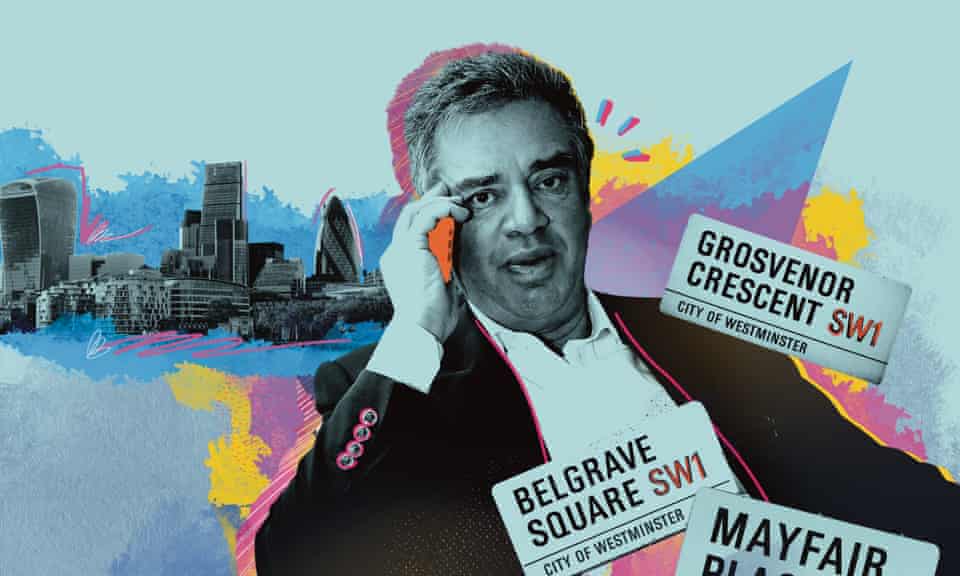
Gary Hersham has been selling houses to the very rich for decades. At first, £1m was a big deal. Now he sells for £50m, £100m, even £200m. What does it take to stay on top in this cut-throat business?
As he swerved from conversation to conversation, Hersham modulated his tone accordingly: from soothing compliments to bawling out an underling. He did this instinctively, it seemed, his personality as volatile as the job required, and indivisible from it. The work was the conversation. “Was it a good price or not?! Just a simple yes or no!” Next call: “Believe you me, I know it was the best apartment I’ve ever seen.” Next call: “You’ve got us into serious trouble because you left a door open!”
Hersham would not leave a door open. He is fastidious, and arranges his stamp collection, which contains every stamp from the Queen’s coronation to the present day, in precise blocks of four. In an industry famed for its lack of scruple, he is a firm believer in probity. “Life is always to do with kindness,” he told me. “It doesn’t mean you can’t negotiate hard, but you’ve got to negotiate fairly, that’s my motto.” In other words, he shouts at people a lot, but what he shouts is true.
We were going, it emerged, to a country house not far from London. The journey out of town allowed Hersham and O’Brien to exchange information on properties we were passing.
“What’s going on over there, Gary?” asked O’Brien, of a grand edifice near Hyde Park.
“Well, it was renovated about 10 years ago,” said Hersham. “A very strange house.” He knew its owner, its previous owner, its interior design, probably its future. He knows every building of note in the city: their provenance, square footage, basement depths and ceiling heights. He knows which would suit one of his buyers: the new-build penthouse for the Indian billionaire; a stuccoed hunk of Knightsbridge for the Chinese industrialist.
London was soon behind us. Prime central London, or PCL as it’s known in the real estate industry, had given way to the kind of areas that tend not to cross Hersham’s desk. Acton, Ealing, Hillingdon, Hayes. Then the motorway, fields, lanes, villages.
“One second,” shouted Hersham. “I’ve got no signal, this is a disaster! I’ve got no signal! You need to turn the car around. I need signal.” Ring ring. “Hi, how are you? I’m seeing a house in the country, I lost signal.” Pause. “Reverse the car, reverse the car, reverse the car! Every conversation I have I lose the fucking signal! Just stop the car!”
Through a pretty village, down a narrow lane, the car stopped outside a large, gated redbrick manor.
“Is this the house?” asked Hersham.
“Yes, this is the house,” said O’Brien.
“You sure?”
“Positive.”
“There’s no driveway!”
Middlemen. They say the right things, know the right people, take a cut. Sometimes, it’s not obvious what they actually do. But then you try to do something without them and it falls apart, because there’s no interpreter, no buffer, no oil. An agent, as their name implies, makes things happen. The world moves through them. Without them, you’re writing a book that no one reads, selling a house that nobody sees.
Hersham is one of an older generation of estate agents in London – mostly men – who have been selling the city’s most lavish homes since the 60s. Among them, Andrew Langton of Aylesford (patch: Chelsea); Peter Wetherell of Wetherell (Mayfair); Trevor Abrahmsohn of Glentree (“the north-west London corridor”); Jonathan Hewlett (central London) and David Forbes of Savills (the entire rich world). These are names known to everyone in the industry, the “old school”, according to Anthony Payne, founder of LonRes, a digital network for prime London agents. They are agents from a pre-corporate age, who agent the old-fashioned way, through contacts, lunches and charm, who care less about KPIs than the unquantifiable skills of inspiring a client’s fidelity and always making them feel as if they’ve won.
They all have their particular styles. Langton is frank and humorous – he was “drunk for about a week” after his first sale of a house in Fulham for £4,000 in 1968 – with a telephone patter that spans the problems with Barnes Bridge (“no one wants to repair the bloody thing”) and the woes of the job (“it’s not all beer and skittles, I can tell you”). Forbes, an ex-Gurkha, who started out in Knightsbridge with an A to Z and a battered old car, is gracefully self-deprecating: “I think people bought from me out of sympathy, I didn’t know a thing.” Wetherell is more stately, with the air of an old English hymn. (“I like selling history,” he told me.) Abrahmsohn, meanwhile, is more of a talk-your-head-off kind of guy, “a big Brexiteer”, full of stories of negotiating deals through a limo window, proud of his “vines and networks” that spread across the world. “I work on psychology, and a lot of chutzpah.”
And then there’s Hersham, the character-in-chief, famous in the industry for his hair (flamboyant), his company’s impressive sales record (“100 units a year”) and his personality (so dominant and capricious that it can make the inside of a Volkswagen Golf feel like it’s laced with explosives). One fellow agent characterised Hersham’s selling style as, “lock them in the car and don’t let them out until they’ve bought something”. “Shout at someone and play hard until you get the price you want,” suggested another. Hersham does not trade in self-effacement. “Can I have an offer now, please,” I once heard him brusquely instruct a buyer on the phone, as if purchasing a multimillion-pound house was no longer the buyer’s choice. “As I’ve said to his face many times,” said Payne, who used to work with Hersham, “he’s a lunatic, but he’s a phenomenal operator.” (Hersham’s self-assessment of his industry reputation was less kind. “Some hate me, some think I’m not straightforward. Abrasive. Difficult to work with.”)
Abrahmsohn, the self-described “parable of Thatcherite enterprise”, told me that he made a point of wearing Marks & Spencer suits – his way of saying that even if he’s showing a £50m marbled mansion on The Bishops Avenue, he’s still Trevor, who started out in the 70s with a £10,000 bank loan and a bright green Alfa Romeo Alfasud. Hersham takes a different approach. His suits are tailor-made in Italy and his shirts come from a Milanese atelier. He collects art, reads widely, loves film. His professional mode, meanwhile, is “bullish”, according to O’Brien. “Bombastic?” interjected Hersham. “Bombastic is maybe the word,” conceded O’Brien.
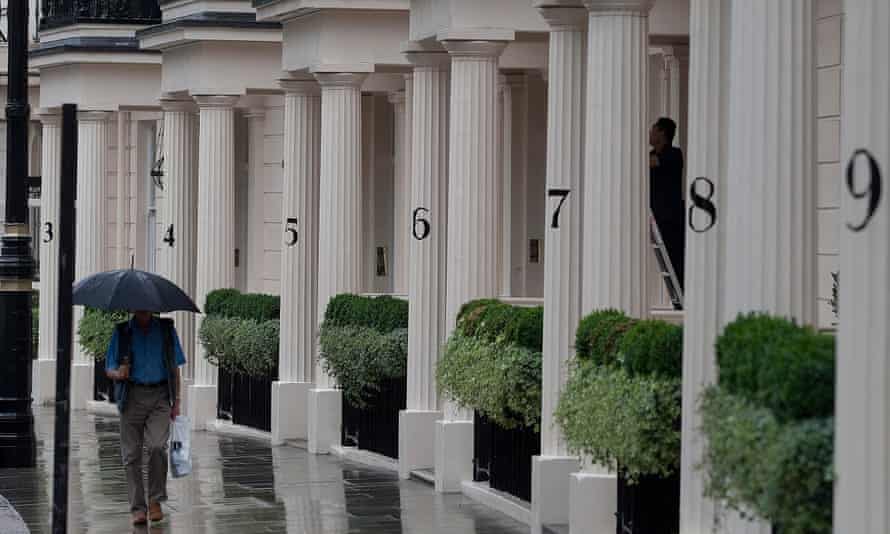
Hersham grew up in a large white house on a fine strip of super-prime, Avenue Road in St John’s Wood. He was the son of a successful businessman, Bill Hersham, who ran three public companies, working in textiles, banking and insurance. The family were what he describes as “modern Orthodox”, and Hersham remains devout (he prays every day). He speaks Hebrew, Yiddish, Italian, Spanish, French, German, “bad Arabic and bad Russian”. Education was prized, and Hersham got a lot of it: after school, he spent two years at a yeshiva in Israel, then studied zoology, biochemistry and applied entomology at Imperial College, before starting a PhD at the Royal School of Medicine. Hersham then went to work for his father, who was “a bit of a tyrant, probably like me”.
Hersham decided to escape the family business and joined a friend who had just set up an estate agency – Scott Gilroy on Beauchamp Place in Knightsbridge. They changed the name to Beauchamp Estates, and in 1977, Hersham bought out his friend and began his dogged professional ascent. The name was key: a reference to the agency’s old-money address, but also a name that hints of French elegance and English aristocracy (William de Beauchamp, ninth Earl of Warwick, 1237-1298) and comes wired with potential humiliation by requiring you to know before opening your mouth that it’s not said how it’s written. (It’s pronounced “Beecham”.)
Back then, London was a different place. “There were very few estate agents,” said Andrew Langton, who had started out a decade earlier, in the mid-60s. Most of the larger agencies were still only interested in commercial sales or farm management, rather than houses. There wasn’t even a property market in the way we understand it now. “You bought a house to live in, as opposed to make any money out of it,” said Langton. For two decades, from the early 50s to early 70s, house prices had barely risen. But then, as the Bank of England eased credit conditions, mortgages became more readily available, housebuilding slowed and supply became limited, house prices rapidly rose. At the start of the 70s, the average house price in Britain had been a little over £4,000. By the end of the decade, it was just short of £20,000.
At the top end of the market, London experienced its first injection of overseas cash. The price of oil doubled in 1973 and had quadrupled by early 1974. “The Middle East got hold of their money,” as Langton put it, “and we witnessed this extraordinary buying spree.” That spree was replicated in the next few decades by buyers from Russia, after the fall of the Soviet Union in 1991, and China, after its rapid economic growth in the 2000s. An ongoing buy-to-let boom helped fuel the merciless climb in house prices, and all the while, the very nature of wealth was changing. “You have to understand, in the 70s and 80s, somebody worth £10m or £20m was phenomenally rich,” said Hersham. “Today, it’s a pittance, absolutely nothing.”
O’Brien told me about a client he first met in 2019, then worth £1.2bn. By the time they were showing him properties the following summer, he was worth more than £25bn. “Wealth has grown exponentially,” said Hersham, and its effects have distorted the city’s property market. Whole neighbourhoods are now the preserve of the super-rich – not that you see them. “It’s not for me to be bothered about somebody keeping their house empty,” Hersham told me. “It’s not my position to be worried about things like that. The truth is, lots of people don’t occupy expensive houses all year round. Most have a second or third or fourth home. You can’t expect them, if they have that many homes, to occupy them all year round.”
The Beauchamp Estates head office, with its gold-tipped black railings and ice-blue external up-lighting system – oddly reminiscent of Elsa’s palace in Frozen the Musical – occupies an entire townhouse on Curzon Street in Mayfair, but Hersham sells across central London, rural England, Monaco, the French Riviera, Greece, Israel and New York. The walls of the reception area are covered with silver-framed photographs of sold properties, with captions that contain detectable Hersham flourishes. La Belle Epoque, Monaco, 16,000 sq ft, €250m: “Undoubtedly one of the finest and most expensive apartments sold anywhere in the world.”
Beauchamp Estates employs 80 agents worldwide, and will often team up on a sale with an agency such as Knight Frank or Savills to extend the limited pool of buyers who can afford such properties. They then share the 2% commission, which is low compared to the European rate. “They’re on 3-5%,” Langton told me. “America, 6%. We’re scrambling around like chickens in a farmyard trying to get 1% or more.” At this end of the market, the aim is not volume of sales, but the value of those properties. As Nigel Lewis, an editor at The Negotiator, put it: “There are a lot of posh agencies fighting over a very small number of sales.”
The British prime market has had a strange couple of years. During peak Covid, when overseas buyers couldn’t travel, it turned purely domestic, and the rich who were already here wanted out of the city. “You’d try to find a nice four-bed near Newbury with a tennis court and a swimming pool and it’s gone by the time you’ve got down the motorway,” said Langton. But then the buyers realised that Newbury was a solid 90 minutes down a congested M4, and London prime sales began to rise again. In January this year, Beauchamp Estates revealed that they’d doubled their number of super-prime sales in 2021, from 17 sales over £15m in 2020, to 32 in 2021. They predicted the figure would double again in 2022. Savills, meanwhile, reported that prime London property prices were now rising at their fastest pace since 2014, and predicted an 8% growth in prices this year as “pent-up demand from international buyers” flowed back into town.
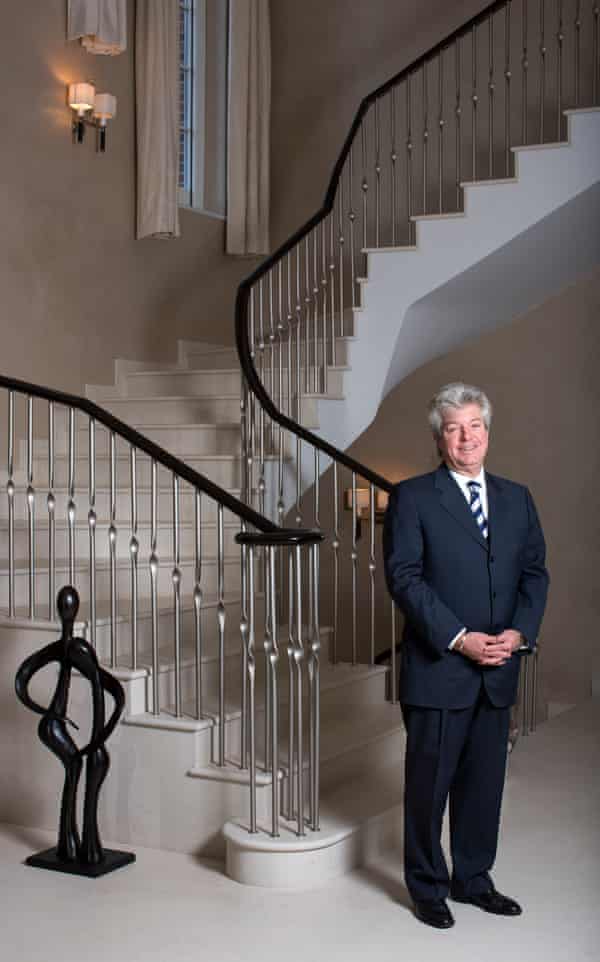
The international buyers want the same things they’ve always wanted: a safe place for their cash, rule of law, no corruption (ha!), and an expensive British education for their children. “One of the key things is schools,” said Edwin Smith of Spear’s, a magazine for ultra-high-net-worth individuals. (Eton, Wycombe Abbey, Wellington College, Charterhouse, Millfield and Milton Abbey are the most viewed by readers on the Spear’s online Schools index.) A buyer from China or Russia “might relocate their whole family when they put their child into one of the top schools”.
For these kinds of buyers, London’s prime agents have a “bottom drawer” of the best properties for sale that never go anywhere near the open market. “We let them into the inner sanctum,” Abrahmsohn told me, referring to the small group of buyers who are shown the most exclusive properties. “That’s called a placing. It’s not to do with boards and advertising, or internet nonsense.” Full transparency about how the actual process unfolds is neither required, nor desirable. “Confidentiality is an important part of our business,” he added.
The agency itself, then, is a kind of mirage. The biggest sales are quietly negotiated by a small group of extremely well-connected agents concealed behind company names invented to imply upper-class British discretion. “It’s why Foxtons is called Foxtons,” said Nigel Lewis. “It’s just a name they picked because it sounds posh.”
This is Britain as brand: a commodification of a fractional way of life that required a townhouse, acreage, staff – and died between the wars. Never mind that there’s almost no one in this country who can remember or afford such an existence. Extremely rich people from other places adore it and want to recreate it, and the prime estate agents know how to sell it. You hear it in their language, the lexicon of heritage filling the Beauchamp Estates brochure: “Steeped in history”; “one of London’s finest addresses”; “the heart of old Chelsea”. A slice of fictional England, a portal to aristocracy, yours for £10,000 a square foot.
Back at the driveway-less country house, Hersham strode through some light rain to the front door. “Just need to warm up for a second,” he announced. Tea was served by the housekeeper, who beamed as Hersham complimented the unusual blend of tea-leaves in the pot. Warmed, Hersham coursed with new energy. The bleak country lanes were forgotten now that he was back in his natural habitat of beautiful rooms. As the housekeeper led him round, he gave a virtuoso performance, accurately guessing when the house was built, praising the handmade wallpaper, which covered even the light switches, and leaping upon a set of delightful hinges that enabled some double doors to fold back completely. O’Brien, meanwhile, deftly handled the plastic covers of the golf carts that whisked us round the outbuildings in the rain.
Hersham doesn’t need long in a place to get the measure of it. He can estimate square footage by sight, commit a floorplan to memory and offer a sensible valuation. He is not a believer in overstating the price. “There’s a lot of people out there in my profession who have the ability to be straight-faced and to say one thing one day and one thing on another day. This is not what I want to be,” he said. “This is more the younger generation,” he added, darkly. “Not the older generation.”
There is much talk, in London prime real estate circles, of this new generation, perhaps because they pose a challenge to the old guard. They’ve found new ways of doing the work. Younger prime agents fill Instagram with videos of themselves giving tours of London mansions, a style pioneered by a man whose name suggests he was always destined to become a personal brand: Daniel Daggers. “Along with Gary Hersham, he’s the other really interesting person in this market,” said Edwin Smith of Spear’s.
Daggers – “AKA #MrSuperPrime”, according to his Instagram profile – grew up in local authority housing in west London, began working at a small agency in his late teens, then moved to Knight Frank where, in the early days of Facebook Live, he streamed himself wandering round 432 Park Avenue, more than 80 storeys of latticed white concrete containing some of New York’s most expensive new apartments. “I walked around this apartment like a novice, shifting the camera back and forth,” Daggers told me. But it worked: the video picked up thousands of views thanks to an early version of what would become his trademark style: relaxed, chummy, with a warm to-camera gaze.

Daggers realised he was on to something – people liked the chance to snoop inside luxury properties, and the videos were essentially free marketing. “I got back to London and said: we need to professionalise this; this is the future of our industry,” he said. Daggers’ approach caused him some problems, however, when he was reported to have posted photos of a client’s house on Instagram without their permission and was obliged to leave Knight Frank. “All of the posh agents mention him as an example of why you should never use social media,” said Nigel Lewis. “But it’s been the making of him.” In early 2020, Daggers launched his own company, Daniel Daggers Real Estate. The website boasts that Daggers has sold more than $4bn worth of property, and carries a large portrait of him on the front page, smiling into the distance, a slice of expensive watch poking out from under his jacket sleeve. Seven years after his Facebook Live breakthrough, his selling strategy still involves committed use of social media. “Exactly the kind of space you want to live in,” he said in a recent Instagram tour of a shining white marble kitchen-breakfast room, “because you will end up living here, no doubt.” But Daggers emphasises that he’s not going to plaster your toilet all over his Instagram stories if you don’t want it there. “I can do super-discreet and I can do super-loud,” he told me. His self-promotional mode follows the American style, where realtors have long planted pictures of their faces on sticks in front lawns and Netflix’s Selling Sunset has made stars of its Los Angeles agents.
Daggers’ own celebrity complements that of his clients. His insight, according to Lewis, is that “there’s a new type of wealth coming out: a wealth built on fame”. For this kind of buyer, a house is the ultimate avatar: the easiest way to demonstrate financial and domestic success, sexier than a balance sheet and far more effective in photographs. “That’s why Daggers has got it right,” said Lewis, “because that’s the way it’s going.” “He’s creating brand Danny Daggers,” said Anthony Payne. Or, as Daggers put it, “I digitised me as a human being.”
Many of the older agents remain unconvinced. Instagram offers cost-effective marketing, said Abrahmsohn, but “it’s not going to help you do the deal”. Buyers who wanted privacy would still turn to the traditional agents. Hersham’s objections were more fundamental. “Let me put it this way,” he told me. “I’ve never been on Instagram. I’ve never looked at it. My children use Instagram. I don’t even know how to use it, nor do I want to know how to use it.” (Beauchamp Estates employs a social media manager.) For Hersham, it wasn’t just technological discomfort, but a sense of decorum, of how things should be done. “There’s one chap whose name I don’t want to mention,” he told me. “I’m a joint agent with him on a £110m property and I was on a call with him today.” The other agent suggested to the client they remove a rug in the hallway to better show off the space, and “I wanted to say, ‘Fuck off!’ Excuse my language. You can’t afford a £110m house, how do you dare turn round to the client and say take that away?”
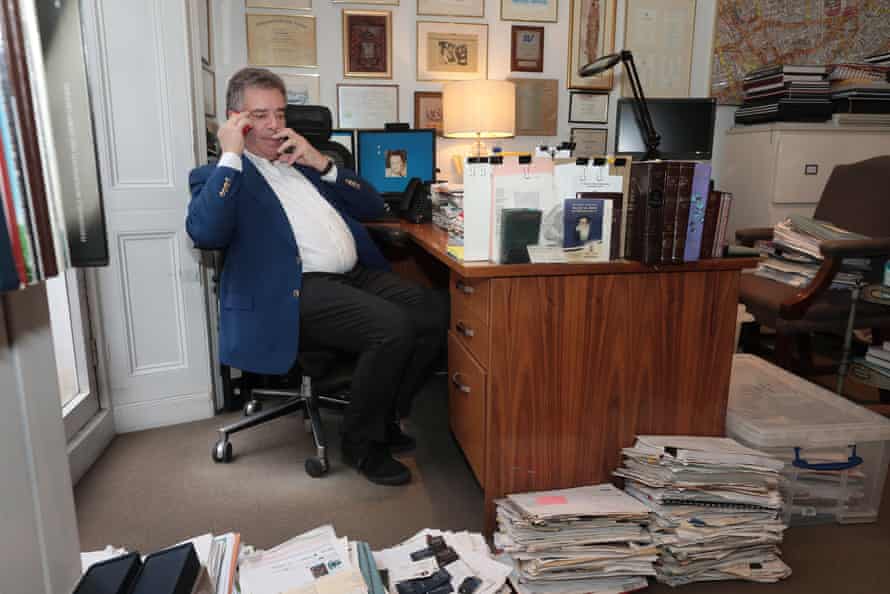
To Hersham, such behaviour was an unconscionable failure of etiquette. The client is king; you compliment their taste even if you think it’s awful. You certainly don’t tell them how to decorate. In this case, the interior was “impeccable” anyway, which suggested the younger agent didn’t know good taste when he saw it. The next generation could post any number of adrenalised house tours on social media, but they couldn’t summon four decades of deep expertise, nor could they be trusted to know the quality or correct positioning of a rug.
The job, to Hersham’s eye, has little to do with self-promotion. (Although, always contrary, Hersham frames and hangs his press interviews in the Beauchamp Estates lobby.) Instead, it requires a more complicated performance: simultaneously powerful and deferential, an insatiable desire to sell combined with a refined discretion. At times, his commitment to propriety leans into absurdity. I once heard Hersham reprimand a junior employee about a pair of shoes being left in the office reception area, as if their presence constituted a grave moral transgression. Another time, he bellowed at a buyer on the phone, warning them not to go with a rival agent. His tone was so extreme, I presumed he must be joking. “Absolutely not,” he told me. “Because I’ve put so much work in – my work has to be respected. There is an obligation on people to be loyal.” His expectation of appropriate behaviour often seemed to result, paradoxically, in questionable behaviour. No one could possibly meet his standards, least of all himself.
Early summer, and Hersham was at his desk in the Mayfair office, punching out emails with one finger. Ring ring. “For God’s sakes!” Ring Ring. “Big kiss. Love you.” Ring ring. “They can’t go! They’re going to be in quarantine!”
A breath, the briefest of pauses.
“It’s quite quiet at the moment,” he told me. We’re about to do a deal at just under £100m. Don’t ask where; I wouldn’t tell you. I wouldn’t dream of telling you.”
He’d been in the office until 2am the previous night. Often, Hersham will go home to his flat in Knightsbridge, have dinner with his wife, then come back. The billionaires can call him any time, day or night. (“If you think he’s intense now, he’s calmed down quite a bit,” Anthony Payne told me.) Today, the conversations were operating on multiple platforms, a situation with which Hersham was struggling given his generational preference for the telephone. “What with all these applications – WhatsUp, emails, SMS, LinkedIn – I never finish,” he said.
WhatsUp?
“What should one say?”
WhatsApp?
“Oh! I always call it WhatsUp.” As if the app had got it wrong.
A three-way Zoom was due to start with two representatives of an anonymous buyer, but the technology was defeating him. Emily, his fantastic secretary, was summoned. Finally, there they were, boxed on his screen: two other middlemen on the hunt.
“Hello, I don’t know what we’re talking about. Do you want to tell me?” Hersham barked.
“I think you have a few hotels? We’ve got a few buyers, looking for hotels.” Hotels to buy, that is.
Hersham confirmed he had hotels. They wanted details. “Absolutely not! Please let’s do things the correct way. You need to tell me who you’re acting for, and are these people capable of spending £165m?”
The men, so recently bullish, began to crumple. Hersham wanted everything on email. One of the men promptly sent over his email address on WhatsApp. Mistake. “Don’t do it by WhatsUp please. Send me an email properly. I can’t get all this nonsense. The idea of sending me to WhatsUp so I’ve got to email is madness.”
Ring ring. Hersham took the call, chatted in Italian, ended the call, “Grazie, ciao.” An assistant placed a pile of files on his desk. He’d lost interest in the Zoom call, wanted to move on. The men asked if they could talk to any of the hotel investors. Another mistake. “No! I made it quite clear. You can’t speak to anybody. You can’t, you can’t, I’m sorry!” More crumpling. “Boys, I have to go!”
He shook his head. Dodgy business. I wondered how he knew. “You get a feeling,” he said. Suspicious people cross his path all the time. A few years ago, he’d shown a flat on Wilton Crescent to a man obviously faking a Russian accent. Hersham man-marked him round the building, then reported him to the police. Turned out, he was one of the gang who had stolen Tamara Ecclestone’s jewellery from her Kensington mansion in 2019.
The Zoom call raised Hersham’s suspicions because of the men’s unwillingness to say who they were working for. “I know how I like to work,” he said. “And if somebody has a buyer, they need to name their buyer to me.” This wasn’t just Hersham’s propriety talking. Until 2017, an overseas buyer could hide a purchase beneath “three or four layers and park up £20m over here with no one blinking an eye”, as one agent put it. Or in other words, use a massive London house to launder a lot of cash. (In 2015, the magazine Private Eye discovered that over the previous decade, £170bn of property in England and Wales had been acquired by offshore companies registered in tax havens.)
Now, however, there are stricter requirements, introduced under the 2017 Money Laundering Regulations and recently upgraded. Estate agents have to obtain more detailed information on buyers before they can proceed with a sale. They can’t just be palmed off with a company name, but must have a proof of ID and address for the “ultimate beneficial owner” of the property. Some agents bemoan the increased paperwork, and some, according to Nigel Lewis, still “turn a blind eye to money-laundering”. But most I spoke to welcomed the tightened rules, tired of being blamed for the tide of murky wealth that swept into London over the decades (from which they were quite happy to take their cut). “If you go back two or three years, a lot of agents had to stop and look at themselves,” said John Ennis, head of Foxtons private office, who told me of deals now falling through if buyers tried to sidestep the correct process. “People think it makes life harder,” Hersham told me, “but it makes things easier, because you know who you’re dealing with.”
But the new rules don’t stop billionaires from buying up chunks of London and leaving houses empty for years. Take 2-8a Rutland Gate, Beauchamp’s triumph, previously owned by Crown Prince Sultan bin Abdulaziz of Saudi Arabia, and bought by the Chinese billionaire property developer Cheung Chung-kiu, who also owns the “cheesegrater” skyscraper in the City. After the sale went through in early 2020, Cheung’s team launched a website on which they published planning applications and design schemes. Once finished, the house could be worth between £500m and £600m, making it the world’s most expensive individual home.
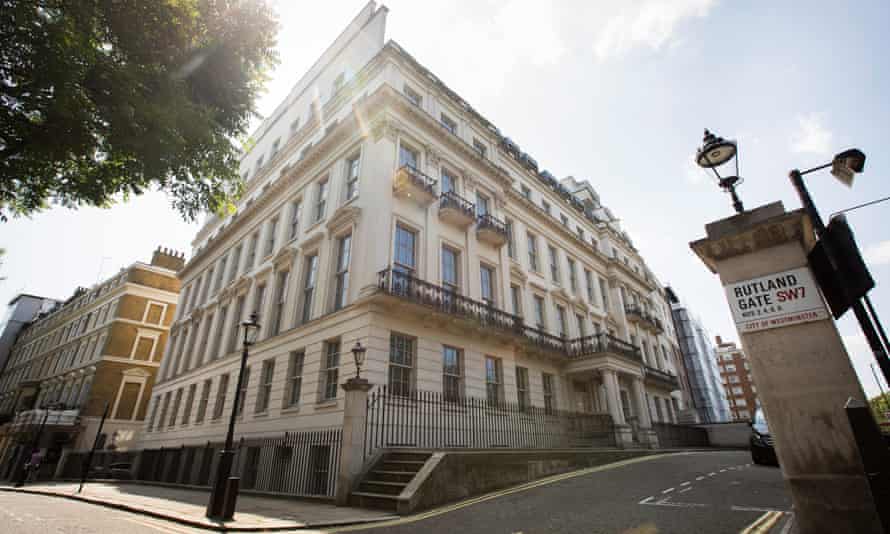
One winter afternoon, I went to look at it, walking there from Green Park, the Ritz glinting at my back, along Knightsbridge, past One Hyde Park, the Candy brothers’ luxury development in which the penthouse was marketed for £175m last year, and past a yellow Ferrari parked outside the Harvey Nichols Christmas display of men lounging in skiwear. Finally, there it was, six storeys of 19th-century white stucco, 12 filthy windows across. The property looked run-down, unlovely and unloved. The only sign of life was a row of hi-vis vests hanging on a coat rail in a basement room. (The place will be a building site for years.) Like other parts of prime central London, the only people out on the street round here were its private workforce: builders, cleaners, gardeners, housekeepers.
Seeing this lifeless husk of real estate prompted all the obvious furies: the waste of space in a city where most people lack it, where many have none at all; the pointlessness of that kind of wealth; the ways it could be better distributed. But there was something else, too – the particular atmosphere around a property whose owners can afford not to use its 45 bedrooms. Uninhabited, it was simply an asset with none of the qualities you might associate with a home. Lights, people, sounds. It’s the same in so many prime London neighbourhoods where the houses sit empty. The buildings reek of loneliness; a kind of great, oppressive vacancy. Nothing moves.
November, a central London townhouse. Carpets like fresh snow, so deep and soft we left footprints. Hersham noted the backlit onyx, the neat en suite attached to the staff bedroom, the dumb waiter that came up from the stainless-steel professional kitchen in the basement. (The family kitchen was an overwhelming marble creation upstairs.) In the sub-sub-basement, inside the tiled cubicle by the pool, there was a shower head the size of a Sky dish. We climbed the marble stairs to the hallway. Ring Ring. “Fabulous,” Hersham told someone on the phone. He turned to me. “What do you think?” My face must have betrayed me. “It’s not about taste,” he admonished. The house was perfect for a certain kind of buyer. A voicemail to O’Brien, itemising the particulars.
Back in the car, we drove to Hersham’s apartment in Knightsbridge. Two other deals were playing out as we climbed the stairs to the first floor. After a quiet summer, the market had revived and business was frenzied again. Ding ding ding. The messages chimed relentlessly. “Fuck-a-duck,” said Hersham, putting someone on hold. Inside the flat were all its original features, huge windows, extravagantly high ceilings. The living room contained an unexpected disco ball in one corner, alongside contemporary light sculptures and modernist paintings. “Do you notice a single painting that isn’t straight?”
A multiplicity of taste was on display, as if to reflect the contradictory impulses of Hersham’s character – overspilling excess combined with obsessive order. “Imagine the light pouring in in the daytime,” he boomed. “Imagine the disco ball with the sunlight shining on it around the room.” Intricate frieze decorations were picked out in gold leaf at eye level and gold paint higher up. There were Chinese urns, art books, mantelpieces crammed with so many pictures of his family that you couldn’t see most of their faces. “Family is everything. Everything.” Unlike the apparently untouched homes in the Beauchamp Estates brochure, full of rooms that have the distinctive air of having been designed remotely by a professional with too large a budget, this seemed to be a place where people actually lived. The sofa looked much sat upon. The books had been read. At the kitchen table there was a little high chair for his grandson.
For the first time in our meetings, Hersham sat down on an armchair and did not look at his phone for 20 minutes. He looked physically distressed by the experience, as if trying to suppress a bout of indigestion. Ding, ding, ding. “You don’t understand how stressful agency is,” he said. The kind of stress that is addictive, adrenalin-rich. “Do you have a picture of me?” he suddenly asked. “Do you understand who I am?” As if there might only be one answer.
The night before, he’d been invited to a grand dinner by some business colossus. He was seated next to the host, which surprised Hersham, as he’d only met him for the first time a few weeks ago. “I asked,” – as only Hersham would – “‘Why have you invited me? And why am I sitting next to you?’” The host told him that they had found him easy to talk to and – evidently to Hersham’s delight – knowledgable. That is, he was more than just an estate agent. Most agents, he told me, were limited characters who could talk about nothing but property. “You wonder to yourself, would they be good company at supper?” Hersham, by logical extension, was good company at supper. All those languages. All that learning. An ability to transform himself into whatever was the most beguiling version of his character, a chameleon gift that appeared instinctive, but was in fact, as he put it, “honed”.
Ring ring. An overseas buyer, looking in London. “You’re not to go to any other agent! You’re not to go to any other agent! If I find you going to another agent, I’ll be really upset with you!” There was a pleading tone on the other end of the line: would Hersham look after her? Hersham made a signature tonal switch, suddenly all softness. “Of course I will.”
After the call, Hersham lapsed into self-reflection. “I don’t want to be painted as anything other than the way I am,” he said. “I’m as black and white as you can get. Either people like me or they don’t like me. I just say what I have to say. No, I say what I want to say.” He paused, realising something. “The funny thing is sometimes words come out of my mouth that actually my head hasn’t told me to say. I can’t quite explain it. I feel it. How did I say that? I’m not talking about saying things rudely, or impolitely. Just the content. ‘Ooh, that’s rather clever, or ooh, that’s rather stupid.’”
He looked amused, a little perplexed, as if trying to fathom how the performance of being himself, a performance he’d been refining all his working life, could remain a mystery to his own intelligence. Ding ding ding. You could see the cortisol thrill through his body. “I need to check my messages.” Out came the phone. Ring ring.

No comments:
Post a Comment